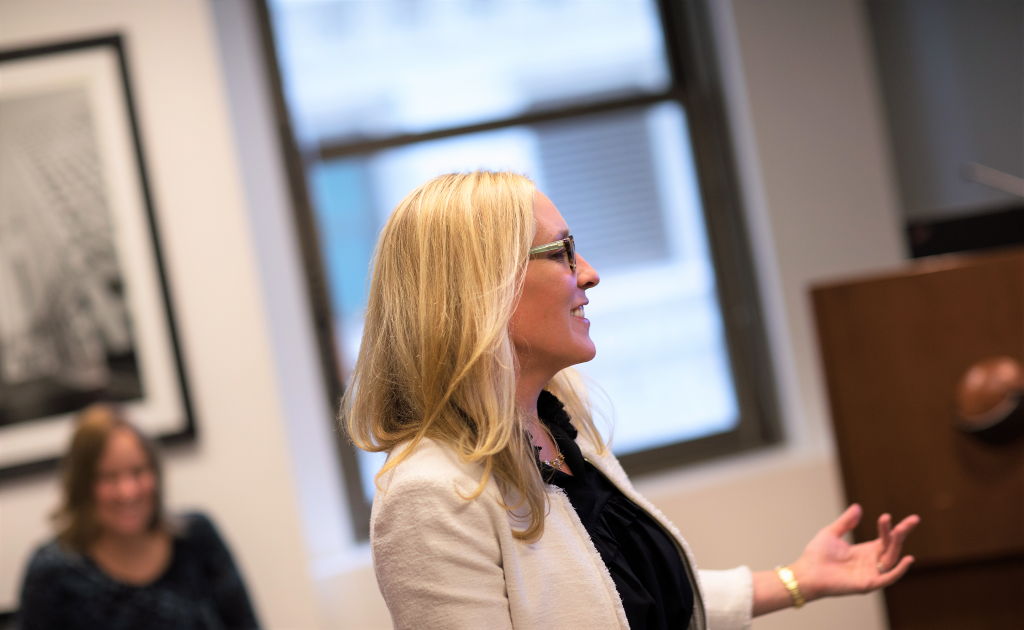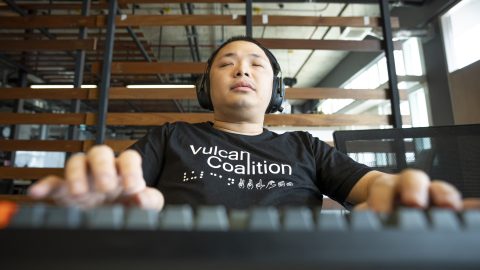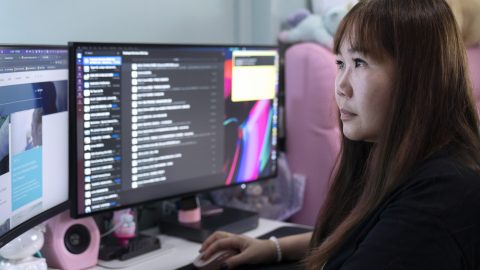Bird’s-eye view: Why tech innovator Jessica Hawk has her head in the cloud
Long before co-founding her technology company, Jessica Hawk, then just 10 years old, enlisted a computer to catalog the giant makeup collection given to her by her grandmother. Years later, when she joined the Associated Press right after college, that undeniable passion for technology and data allowed her to quickly move up the ranks from fetching sandwiches to training journalists to use Microsoft Windows’ latest news-filing software.
A few years and hundreds of training classes later, she left journalism to create Capax Global, a company that leverages Microsoft technology to build custom solutions for businesses around the world, tackling data projects that used to take years and delivering results in just weeks.
When the company launched in the early 2000s, business leaders were moving away from one-size-fits-all licensing agreements and needed more sophisticated and customized technology solutions. Capax Global was there to supply just that, and the company grew rapidly to meet demand.
Though the company worked on a broad range of services, over the years Hawk and her fellow board members noticed employees were especially excited to work with Microsoft’s Azure cloud services. So in 2015, they made the leap to focus solely on Azure, a move Hawk says “took some guts,” but has allowed the company to narrow its focus and develop deep expertise.
At the Microsoft Inspire 2018 conference, we sat down with Hawk, now in her early 40s, to talk about why she went all-in on the cloud, how her background in journalism still influences her today, and what it means to be a good leader.
TRANSFORM: Just a few years ago, Capax was a dramatically different company. What inspired that transformation?
HAWK: In 2015, we reset the business—I call it the re-imagining. By then we had become very large, around a thousand people, and the Microsoft [Azure] Stack was one component of it but certainly not the biggest. However, we saw our teams were so excited to work on those projects, so we decided to take a leap of faith and we divested all non-Microsoft-related parts of our business. It was a combination of employee engagement and, at that time, customers were getting really excited about analytics and AI becoming meaningful and real in their environment.
TRANSFORM: Capax identifies itself as an intellectual maverick. What is that, and how is that mentality reflected in the company?
HAWK: To go after a problem in a really unique and innovative way takes a little bit of individual thinking, so ‘maverick’ is the ability to see an opportunity that others might miss and not to feel like you have to do it the way it’s been done before. Our employees are empowered to make creative decisions. They’re empowered to study the problem.
TRANSFORM: Your undergrad degree is in history, and you started your career in journalism. How did you end up in the tech industry?
HAWK: When the Apple IIGS [computer] came out, I was about 10. My grandmother used to get me giant makeup kits for Christmas every year, so I had quite the haul of makeup—I probably had 300 various items. So the first thing I did when I got that IIGS was I built a little inventory of my makeup. I had to think through, “Well, I have different types of makeup so I should probably have a lipstick category and an eyeshadow category. Then, oh, there are different attributes: color, does it last long…”
So I built myself a data model of my makeup as a 10-year-old. I just loved working with computers. When I went to the University of Virginia, my parents said to get a liberal arts degree because, “it’s the last chance you’ll get to learn how to communicate in the world, and nothing is more important than good communication.” But I still liked computers and started taking computer science classes and I did really well at those.
But my parents were right, as they always are. I do think technical people sometimes have challenges in terms of the way they communicate what’s happening. That extra time spent learning how to communicate has definitely helped me break down work into a non-technical understanding, which is incredibly important. At the end of the day if it’s all about zeros and ones, nobody’s happy.
TRANSFORM: Looking back at your career, what’s the most important lesson you’ve learned?
HAWK: My favorite thing to talk about is how you work with a team. When I started, I was so results-focused that I had lost the opportunity to get even more results had I understood better at the time that it’s really more about empowering your team and making sure that they understand that you’re going to support them even when they fail. Because failure is going to happen! I managed a team as a 29-year-old and by that time somebody had helped me understand that it’s much more about building that camaraderie and building that common sense of trying to achieve an outcome.
I see the younger folks coming into the company having those same stumbles and I try to work with them to understand there’s a much better outcome if you could just take a step back and work with the team in a more empowering way.
Jessica Hawk, Capax Global COO and partner, addressing the technical leadership team of Capax at their Chicago headquarters. (Photo courtesy of Capax Global)








